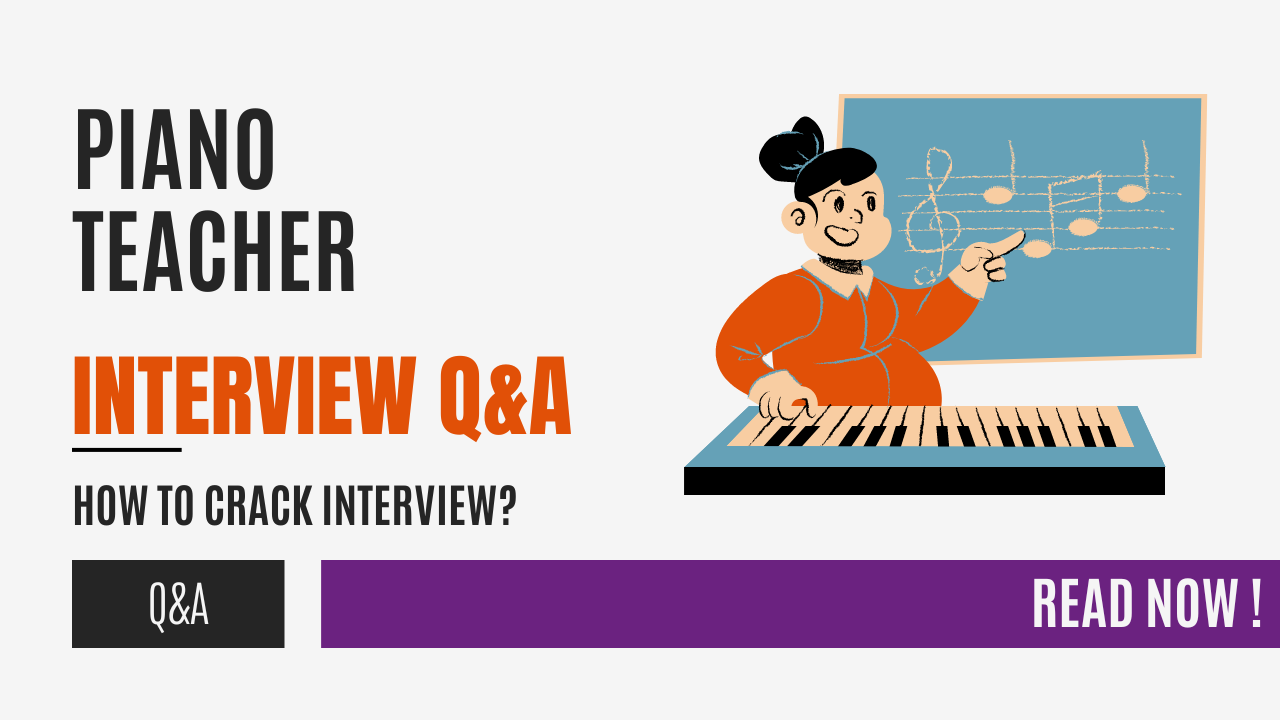Blog Detail

Guide to Piano Teacher Interviews in Malaysia
May 25, 2024
Introduction:
Embarking on the journey to become a piano teacher in Malaysia is both an exciting and challenging endeavor. Aspiring educators must not only possess exceptional musical skills but also demonstrate a profound understanding of pedagogy and the ability to connect with students. One crucial step in this journey is the interview process, where candidates can showcase their talents and passion for teaching. In this comprehensive guide, we delve into the intricacies of the piano teacher interview in Malaysia, offering valuable insights and tips to help you prepare and succeed.
Understanding the Landscape:
Before diving into the interview preparation, it's essential to understand the landscape of piano teaching in Malaysia. Malaysia boasts a vibrant musical scene with a deep appreciation for classical music, particularly the piano. As such, the demand for qualified piano teachers remains consistently high, with opportunities available in private music schools, conservatories, as well as freelance teaching.
Preparation Is Key:
Preparing for a piano teacher interview requires a multifaceted approach encompassing musical proficiency, pedagogical knowledge, and interpersonal skills. Here's a breakdown of key areas to focus on:
- Musical Proficiency:
- Mastery of Technique: Demonstrate proficiency in playing various scales, arpeggios, and repertoire across different styles and periods.
- Interpretation and Expression: Showcase your ability to convey emotion and musicality through your playing, highlighting your interpretive skills.
- Sight-Reading and Aural Skills: Be prepared to sight-read music excerpts and demonstrate strong aural skills by identifying intervals, chords, and melodies.
- Pedagogical Knowledge:
- Lesson Planning: Familiarize yourself with effective lesson planning techniques tailored to different student levels and learning styles.
- Teaching Methodologies: Understand and articulate your approach to teaching fundamental concepts such as posture, hand positioning, and music theory.
- Student Engagement: Emphasize your ability to engage and motivate students, fostering a positive learning environment conducive to growth and development.
- Interpersonal Skills:
- Communication: Exhibit clear and effective communication skills, both verbal and non-verbal, to establish rapport with students and parents.
- Empathy and Patience: Showcase empathy and patience, essential qualities for nurturing students through their musical journey and overcoming challenges.
- Professionalism: Demonstrate professionalism through punctuality, organization, and a genuine commitment to the craft of teaching.
Interview Practical Tips for Success:
In addition to honing your musical and pedagogical skills, consider the following practical tips to enhance your chances of success in a piano teacher interview:
- Research the Institution: Familiarize yourself with the institution's teaching philosophy, curriculum, and expectations for faculty members.
- Prepare a Repertoire List: Have a repertoire list ready, showcasing pieces you are proficient in teaching across different levels.
- Anticipate Questions: Practice responding to common interview questions, such as inquiries about your teaching experience, approach to student assessment, and methods for addressing student challenges.
- Dress Professionally: Dress in appropriate attire that reflects professionalism and respect for the interview process.
- Bring Supporting Materials: Prepare any supporting materials, such as teaching portfolios, certifications, or references, to supplement your interview.
The piano teacher interview in Malaysia presents a significant opportunity for aspiring educators to showcase their musical talents, pedagogical expertise, and passion for teaching. By thoroughly preparing across musical proficiency, pedagogical knowledge, and interpersonal skills, candidates can position themselves for success in securing teaching positions at esteemed institutions. Remember, the interview is not only about demonstrating your skills but also about conveying your dedication to nurturing the next generation of musicians. So, approach the interview with confidence, enthusiasm, and a commitment to excellence, and you'll be one step closer to realizing your dream of becoming a piano teacher in Malaysia.
25 Common Interview Questions for Piano Teacher and their Answers with Examples
Here are 25 common interview questions and answers tailored for a piano teacher in Malaysia:
1. Can you tell us about your background and experience as a piano teacher?
Answer: "Certainly. I've been teaching piano for over 15 years, during which I've had the privilege of working with students of all ages and skill levels. My background includes formal training in piano performance and education, as well as extensive experience in both individual and group instruction."
2. What teaching methodologies do you employ in your piano lessons?
Answer: "I believe in tailoring my approach to each student's unique learning style and goals. While I incorporate traditional methods such as sight-reading and technique exercises, I also integrate elements of creativity and improvisation to keep lessons engaging and dynamic."
3. How do you assess a student's progress and proficiency?
Answer: "I regularly conduct assessments through performance evaluations, sight-reading exercises, and theory quizzes. Additionally, I encourage open communication with students and parents to track progress and address any challenges or areas for improvement."
4. How do you handle students who struggle with motivation or practice consistency?
Answer: "Motivation is a common challenge, especially among younger students. I strive to cultivate a supportive and encouraging learning environment, offering incentives, setting achievable goals, and providing constructive feedback to keep students motivated and focused."
5. Can you share an example of a particularly rewarding teaching experience you've had?
Answer: "One of my most rewarding experiences was witnessing a shy, reserved student blossom into a confident performer after months of dedicated practice and encouragement. Seeing the joy and pride on their face during their first recital was truly unforgettable."
6. How do you accommodate students with different learning styles or special needs?
Answer: "I believe in fostering an inclusive learning environment where every student feels valued and supported. I adapt my teaching methods and materials to accommodate diverse learning styles, and I work closely with parents and s to address any specific needs or challenges."
7. What role do you believe music theory plays in piano education?
Answer: "Music theory is fundamental to understanding the language of music and developing a deeper appreciation for the piano. I integrate theory concepts into lessons through practical exercises and hands-on applications, emphasizing their relevance to performance and composition."
8. How do you balance technical skill development with artistic expression in your teaching?
Answer: "Achieving a balance between technique and expression is essential for fostering well-rounded musicianship. I focus on developing strong technical foundations while encouraging students to explore their creativity and interpretive skills through expressive playing."
9. How do you stay updated with the latest developments in piano pedagogy and music education?
Answer: "I'm committed to lifelong learning and professional development. I attend workshops, conferences, and seminars, and I actively engage with online resources and peer networks to stay informed about new teaching methodologies and best practices."
10. Can you describe your approach to preparing students for piano exams or competitions?
Answer: "Preparing students for exams or competitions requires careful planning and attention to detail. I provide comprehensive guidance and support, focusing on repertoire selection, technical exercises, mock exams, and performance preparation to ensure students feel confident and well-prepared."
11. How do you foster a love for music and piano playing in your students?
Answer: "I believe that cultivating a love for music begins with fostering a sense of joy, curiosity, and self-expression. I expose students to a diverse range of musical styles and genres, encourage exploration and creativity, and celebrate their achievements and progress along the way."
12. How do you handle performance anxiety in your students?
Answer: "Performance anxiety is a common challenge for many students. I provide strategies and techniques for managing nerves, such as visualization exercises, relaxation techniques, and gradual exposure to performance opportunities. I also create a supportive and encouraging environment where students feel safe to take risks and learn from their experiences."
13. Can you share your thoughts on the importance of parental involvement in piano education?
Answer: "Parental involvement is crucial for supporting and reinforcing students' musical development. I encourage parents to participate in their child's learning journey by attending lessons, providing practice supervision and encouragement, and fostering a positive attitude towards music and learning at home."
14. How do you handle disciplinary issues or behavioral challenges in your students?
Answer: "Disciplinary issues are addressed with empathy, patience, and clear communication. I establish clear expectations and boundaries from the outset, and I work collaboratively with students and parents to address any behavioral challenges in a constructive and positive manner."
15. What strategies do you use to keep students engaged and motivated during lessons?
Answer: "I employ a variety of strategies to keep lessons engaging and enjoyable, including interactive games, creative exercises, and multimedia resources. I also encourage students to set personal goals, explore their musical interests, and take ownership of their learning journey."
16. How do you incorporate technology into your teaching practices?
Answer: "Technology can be a valuable tool for enhancing the learning experience. I utilize digital resources such as interactive apps, online tutorials, and virtual learning platforms to supplement traditional teaching methods and engage students in new and innovative ways."
17. Can you share an example of a challenging teaching situation you've encountered and how you addressed it?
Answer: "One challenging situation involved a student who struggled with focus and attention during lessons. I implemented a structured practice routine, introduced mindfulness techniques, and collaborated with the student's parents to establish consistent practice habits and support at home. Over time, we saw significant improvement in the student's focus and performance."
18. How do you approach teaching students with varying levels of prior musical experience?
Answer: "I tailor my approach to accommodate students' individual backgrounds and skill levels. For beginners, I focus on building strong foundational skills and fostering a love for music. For more advanced students, I offer challenging repertoire, advanced technique exercises, and opportunities for artistic exploration and expression."
19. How do you handle time management and scheduling with a large number of students?
Answer: "Effective time management is essential for ensuring that each student receives the attention and support they need. I maintain detailed lesson plans and schedules, prioritize tasks, and communicate clearly with students and parents to coordinate lesson times and availability."
20. How do you address the cultural diversity present in Malaysia within your teaching approach?
Answer: "As Malaysia is a melting pot of diverse cultures, I strive to create an inclusive and culturally sensitive learning environment. I incorporate music from various traditions and genres into lessons, encourage students to explore their cultural heritage through music, and foster cross-cultural understanding and appreciation."
21. Can you describe a time when you had to adapt your teaching approach to meet the needs of a specific student?
Answer: "I once had a student with visual impairment who required a modified approach to piano instruction. I incorporated tactile and auditory cues into lessons, provided braille music scores, and utilized adaptive technology to facilitate learning. By adapting my teaching methods to suit the student's unique needs, we were able to make significant progress together."
22. How do you handle conflicts or disagreements with parents regarding their child's progress or learning goals?
Answer: "Open communication and mutual respect are key when addressing conflicts with parents. I listen carefully to their concerns, provide transparent feedback on their child's progress, and collaborate with them to find constructive solutions that prioritize the student's best interests and goals."
23. Can you share your approach to fostering a collaborative relationship with other music educators and professionals?
Answer: "I believe in the power of collaboration and community within the music education field. I actively engage with fellow educators through networking events, workshops, and collaborative projects. By sharing ideas, resources, and best practices, we can collectively enrich the learning experiences of our students and contribute to the growth of the musical community."
24. How do you stay inspired and motivated as a piano teacher?
Answer: "I find inspiration in the joy and enthusiasm of my students, the beauty of music itself, and the opportunity to make a positive impact on their lives. I also draw inspiration from attending concerts, listening to recordings, and exploring new repertoire and teaching methodologies."
25. Finally, what do you hope to achieve as a piano teacher in Malaysia in the coming years?
Answer: "As a piano teacher in Malaysia, my ultimate goal is to inspire and empower students to discover the transformative power of music and realize their full potential as musicians and individuals. I hope to continue fostering a love for music, nurturing talent, and contributing to the vibrant cultural landscape of Malaysia through piano education."
These questions and answers provide a comprehensive overview of the skills, experiences, and philosophies that are integral to being a successful piano teacher in Malaysia.
What to Expect in a Piano Teacher Interview in Malaysia?
In a piano teacher interview in Malaysia, candidates can expect a thorough assessment of their musical proficiency, pedagogical knowledge, and interpersonal skills. Here's a breakdown of what to anticipate during the interview process:
- Musical Proficiency Assessment:
- Candidates may be asked to perform various musical exercises to demonstrate their technical skills, including scales, arpeggios, and selected repertoire pieces.
- Sight-reading exercises might be provided to evaluate candidates' ability to interpret and perform music accurately on sight.
- Aural skills may be tested through exercises such as identifying intervals, chords, and melodies by ear.
- Pedagogical Knowledge Evaluation:
- Interviewers may inquire about candidates' teaching experience, including the age groups and levels they have taught previously.
- Candidates may be asked to outline their teaching methodology, including approaches to lesson planning, student assessment, and addressing individual learning needs.
- Questions about music theory, music history, and pedagogical techniques relevant to piano teaching may be posed to assess candidates' depth of knowledge in these areas.
- Interpersonal Skills Assessment:
- Interviewers will evaluate candidates' communication skills, both verbal and non-verbal, to determine their ability to effectively convey musical concepts and build rapport with students.
- Candidates may be asked hypothetical scenarios to gauge their problem-solving skills and ability to handle challenging teaching situations with empathy and professionalism.
- Interviewers may inquire about candidates' experiences working with parents or guardians to understand their approach to fostering positive relationships and effective communication with stakeholders.
- Alignment with Institution's Values and Philosophy:
- Candidates should expect questions about their familiarity with the institution's teaching philosophy, curriculum, and expectations for faculty members.
- Interviewers may seek to understand how candidates' teaching style aligns with the institution's goals and values, including their commitment to fostering a nurturing and inclusive learning environment.
- Opportunity for Candidates to Ask Questions:
- Towards the end of the interview, candidates will typically have the opportunity to ask questions about the institution, the role, or any other relevant topics.
- Asking thoughtful questions demonstrates candidates' genuine interest in the position and allows them to gain valuable insights into the institution's culture and expectations.
Overall, candidates should approach the piano teacher interview in Malaysia with confidence, preparedness, and a genuine passion for teaching and music. By showcasing their musical talents, pedagogical expertise, and interpersonal skills, candidates can position themselves for success in securing teaching positions at esteemed institutions within the vibrant musical landscape of Malaysia.



